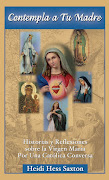
Seems like the perfect day to blog about my favorite mother, who was actually present at that first Pentecost.
Acts 1:13-14When they entered the city they went to the upper room where they were staying, Peter and John and James and Andrew, Philip and Thomas, Bartholomew and Matthew, James son of Alphaeus, Simon the Zealot, and Judas son of James. All these devoted themselves with one accord to prayer, together with some women, and Mary the mother of Jesus, and his brothers.
Mary was already on intimate terms with the Spirit, of course, who had brought about the miracle of the Incarnation. ("The Holy Spirit shall overshadow you..." the angel had predicted). And now she waited alongside her spiritual children, praying with them for the fulfillment of her Son's promise, for the divine mystery to be revealed to them. In this way, we see the three parts of the Body of Christ -- the mystical inner core, represented by Mary; the teaching and leading "skeleton" of the apostles; and the arms of service, represented by the other women "and his brothers."
All through the Bible, the Holy Spirit reveals Himself in two ways: through His sanctifying work, which transforms a person who receives Him and infuses him or her with a new heart, and through His charismatic action. In the latter case, He empowers certain people not so He can dwell in them and sanctify them from within, but so that He can act through them in the community and for the good of the community. ... These charisms are free gifts, given to people not because they are holy and not even chiefly to make them holy but for the service of the people of God. That explains how someone can be charismatic without necessarily being holy (p.126).
Kirkegaard, a philosopher who loved Jesus very much, affirmed that God has created two categories of people: heroes and poets. The hero is the one who accomplishes great deeds and even does battle with death. The poet does not do impressive deeds, but he sings about the hero and is enthusiastic about the hero; he is as happy as if he were the hero himself, because his own genius can be expressed in sheer admiration and devotion. ... For us, Jesus is our hero, and we should be his poets. I do not mean in the sense that we should write poems about Him but in the sense that we are in
love with Jesus. The poets speak through their songs and succeed not only in convincing, but in taking others along with him (p.132).
Would you like to read more about the Holy Spirit and Mary? Today I found this link to a letter from Pope Paul VI on Deacon John's blog. Check it out!












 My StumbleUpon Page
My StumbleUpon Page